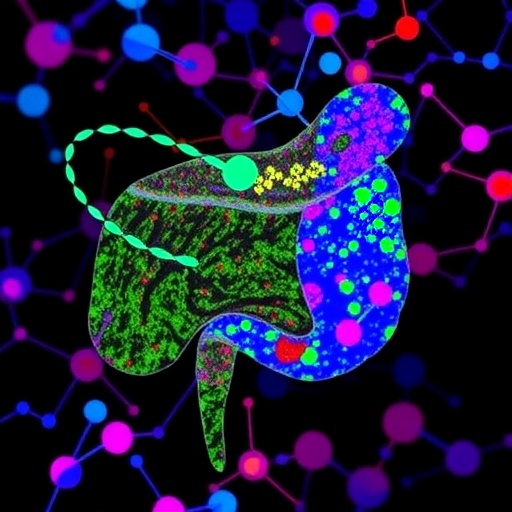In recent years, the scientific community has increasingly recognized the intricate relationship between microorganisms and cancer biology. A groundbreaking study emerging from Nankai University in Tianjin, China, delves into this nexus by exploring the tumor microbiota residing within gastrointestinal (GI) cancers, which constitute a staggering proportion of cancer diagnoses globally. The research reveals a compelling link between the composition of microbial communities inside tumors and the progression, metastasis potential, and treatment responsiveness of these malignancies.
Gastrointestinal cancers, responsible for nearly a quarter of the new cancer cases and a significant share of cancer-related deaths worldwide, present a formidable challenge to clinicians and researchers alike. Despite advances in conventional staging and genomic profiling techniques, patient outcomes remain highly variable, underscoring the urgent need for novel prognostic tools. The study conducted on over 1,600 GI tumor tissue samples indicates that the tumor microbiome—specifically bacterial constituents within the tumor microenvironment—holds critical prognostic and therapeutic clues that could augment existing clinical models.
The research team performed deep microbial profiling across six different types of GI tumors, uncovering a core set of 15 bacterial genera consistently associated with disease progression. These genera demonstrated reproducible patterns across all cancer types studied, suggesting a unifying microbial signature in the tumor milieu that transcends tissue origin. This discovery marks a significant departure from previous research that focused on individual microbial species in isolation, pointing instead to a complex, multi-bacterial landscape interacting with tumor biology.
Mechanistically, intratumor bacteria may influence cancer development and metastasis by modulating host immune responses and altering cellular pathways involved in tumor progression. For example, a higher abundance of Granulicella species correlated with reduced activation of CD8+ cytotoxic T lymphocytes, key players in antitumor immunity, and concomitantly with increased risk of metastasis. Conversely, the presence of Dorea species appeared to promote a more robust immune response, exhibiting protective effects against tumor spread. These findings suggest that microbial composition within tumors can impact the tumor microenvironment’s immune landscape, thereby influencing disease trajectory.
Another significant aspect of this study is the construction of a microbiota-based risk score derived from the abundance patterns of identified bacterial genera. This risk score stratifies patients based on predicted survival and metastatic potential more effectively than current clinical tools alone. Notably, it also provides predictive insight into patient responsiveness to certain immunotherapies, which holds promise for refining treatment strategies. The incorporation of microbial parameters represents a novel dimension in precision oncology, potentially enabling personalized therapeutic interventions calibrated to tumor microbiota profiles.
While genomic and histopathologic staging remain foundational to cancer diagnosis and prognosis, this microbiome-centric approach could serve as an invaluable complementary modality. The microbiota-based model enhances the clinician’s ability to identify high-risk patients who may otherwise be underestimated by conventional methods. Furthermore, it offers a potential pathway to circumvent immunotherapy resistance by signaling when alternative treatments might be necessary. This synergy between microbial ecology and tumor biology epitomizes the emerging paradigm of integrative cancer diagnostics.
The scope of the research’s implications is considerable, especially given the rising incidence of GI cancers among younger populations under 50 years old. As microbial signatures can be detected via routine tissue analyses, deploying these insights in clinical settings is feasible without necessitating extensive additional invasive procedures. The study underscores the urgent need for prospective clinical validation to confirm the utility of microbiota-based tools in predicting disease outcomes and guiding therapeutic decision-making.
Beyond prognosis, understanding the role of tumor-associated microbes opens new avenues for therapeutic innovation. Targeting intratumor bacterial populations directly, or modulating their interactions with host cells, could revolutionize treatment paradigms. Potential interventions may include microbiome reprogramming through antibiotics, probiotics, or microbiota transplantation selectively tailored to restore a protective microbial ecosystem within tumors, thereby enhancing immune surveillance and suppressing metastatic mechanisms.
The multidisciplinary effort encompassing microbiology, oncology, and immunology highlights an evolving appreciation of tumors as complex ecosystems rather than mere collections of malignant cells. Researchers suggest that future studies should focus on dissecting the molecular mechanisms governing microbe-tumor interactions, identifying microbial metabolites and molecular signals influencing tumor cell behavior, and exploring the spatiotemporal dynamics of tumor-associated microbiomes during cancer progression and treatment.
Furthermore, the study’s large-scale analytical approach utilizing publicly available datasets exemplifies the power of bioinformatics in uncovering clinically relevant microbial patterns. By leveraging high-throughput sequencing and sophisticated computational frameworks, the research team delineated robust correlations between microbial profiles and immune cell infiltration, advancing the field’s understanding of the tumor microenvironment’s multifaceted nature.
Ultimately, this pioneering investigation not only enriches the scientific comprehension of gastrointestinal tumor biology but also lays the groundwork for clinical translation that may significantly improve patient prognostication and therapy personalization. With continued validation and mechanistic elucidation, microbiota-informed diagnostics could soon become integral components of cancer management protocols, offering hope for more effective and tailored treatment avenues.
Subject of Research: Tumor-associated microbiota in gastrointestinal cancers and its impact on prognosis and therapy response.
Article Title: Intratumor Microbial Signatures Predict Progression and Therapeutic Response in Gastrointestinal Cancers
News Publication Date: 2025 (specific date not provided)
Web References:
https://journals.asm.org/doi/10.1128/spectrum.00390-25
Keywords: Cancer, Gastrointestinal Neoplasms, Metastasis, Cancer Treatments, Tumor Microbiome, Immunotherapy, Microbial Signatures, Prognostic Biomarkers, Tumor Immune Microenvironment




